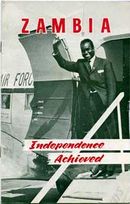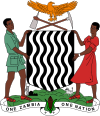History of Zambia (1964–present)
Part of a series on the |
||||||||
|---|---|---|---|---|---|---|---|---|
| History of Zambia | ||||||||
 | ||||||||
|
||||||||
| See also | ||||||||
| Years in Zambia | ||||||||
|
| ||||||||
Zambia since 1964, despite its considerable mineral wealth, Zambia faced major challenges. Domestically, there were few trained and educated Zambians capable of running the government,[1] and the economy was largely dependent on foreign expertise. Most of Zambia's neighbouring countries were still colonies or under white minority rule.
The United National Independence Party (UNIP) won the pre-independence elections, gaining 55 of the 75 seats. The Zambian African National Congress won 10 seats, and the National Progressive Party won all the 10 seats reserved for whites.[2] Kenneth Kaunda was elected Prime Minister, and later the same year president, as the country adopted a presidential system. Kaunda adopted an ideology of African socialism, close to that of Julius Nyerere in Tanzania. Economical policies focused on central planning and nationalisation, and a system of one party rule was put in place.
One party state
In 1968 Kaunda was re-elected as president, running unopposed. During the following years Zambia adopted a one party system. In 1972 all political parties except UNIP were banned, and this was formalised in a new constitution that was adopted in 1973. The constitution framed a system called "one-party participatory democracy", which in practise meant that UNIP became the sole political factor in the country. It provided for a strong president and a unicameral National Assembly. National policy was formulated by the Central Committee of UNIP. The cabinet executed the central committee's policy. In legislative elections, only candidates running for UNIP were allowed to participate. Even though inter-party competition was out of question, the contest for seats within UNIP was energetic. In the presidential elections, the only candidate allowed to run was the one elected as president of UNIP at the party's general conference. In this way Kaunda was re-elected unopposed with a yes or no vote in 1973, 1978, 1983 and 1988.
This did not, however, mean that there was no dissension to the imposition of a one-party rule in the country or within UNIP. Sylvester Mwamba Chisembele who was Cabinet Minister for Western Province (previously Barotse Province) together with UNIP leaders from 7 out of the 8 Provinces established a Committee of 14. The objective of the Committee of 14 which consisted two leaders from each of the 7 provinces was the establishment of a democratically elected council of two leaders from each province to rule the country by consensus with the President as Head of State. If this had been achieved, it would have meant the curtailing of the absolute power residing in President Kaunda. The Committee of 14 attended a meeting in State House at which President Kaunda agreed to consider their proposals. However, later he banned the Committee of 14 and this action was followed by the suspension of Sylvester Chisembele and several leaders were sacked.[3] Chisembele later rejoined the Cabinet as Minister for Eastern Province and two years later in 1977 he was transferred in the same position to the Copperbelt Province, where the political situation was tense, especially so because of the forthcoming General Elections. Simon M. Kapwepwe and Harry Mwaanga Nkumbula, who, before the declaration of a One Party State, had been leaders of the UPP and ANC political parties respectively, had joined UNIP with the intention of challenging for the Presidency. However, their attempt to challenge President Kaunda for the Presidency on the UNIP ticket failed as both were prevented and disqualified by the manipulations of President Kaunda, who stood unopposed. Simon Kapwepwe and Harry Nkumbula challenged the resultant 1978 election of President Kaunda in the High Court, but unsurprisingly their action was unsuccessful.
Kaunda: 1964 - 1991
Chiluba: 1991- 2002
Mwanawasa: 2002-2008
Banda: 2008-2011
Sata: 2011-2014
Lungu: 2015-Present
References
<templatestyles src="Reflist/styles.css" />
- ↑ There were only eight indigenous Graduates in the country at Independence
- ↑ Lua error in ...ribunto/includes/engines/LuaCommon/lualib/mwInit.lua at line 23: bad argument #1 to 'old_ipairs' (table expected, got nil).
- ↑ Lua error in ...ribunto/includes/engines/LuaCommon/lualib/mwInit.lua at line 23: bad argument #1 to 'old_ipairs' (table expected, got nil).


